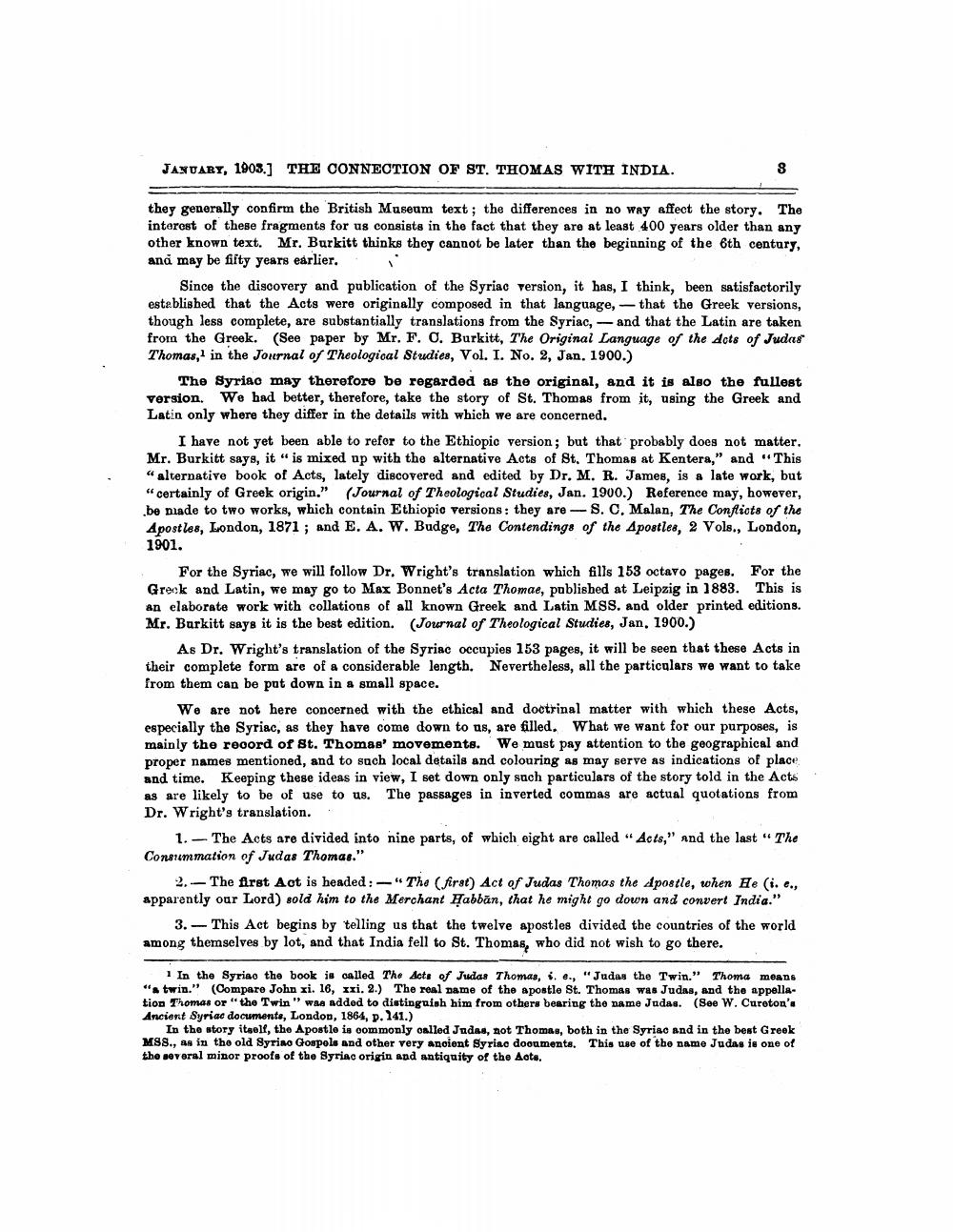Book Title: Indian Antiquary Vol 32 Author(s): Richard Carnac Temple Publisher: Swati Publications View full book textPage 9
________________ JANUARY, 1903.] THE CONNECTION OF ST. THOMAS WITH INDIA. they generally confirm the British Museum text; the differences in no way affect the story. The interest of these fragments for us consists in the fact that they are at least 400 years older than any other known text. Mr. Burkitt thinks they cannot be later than the beginning of the 6th century, and may be fifty years earlier. Since the discovery and publication of the Syriac version, it has, I think, been satisfactorily established that the Acts were originally composed in that language, – that the Greek versions, though less complete, are substantially translations from the Syriac, - and that the Latin are taken from the Greek. (See paper by Mr. F. O. Burkitt, The Original Language of the dots of Judas" Thomas, in the Journal of Theological Studies, Vol. I. No. 2, Jan. 1900.) The Syriac may therefore be regarded as the original, and it is also the fullest version. We had better, therefore, take the story of St. Thomas from it, using the Greek and Latin only where they differ in the details with which we are concerned. I have not yet been able to refer to the Ethiopic version; but that probably does not matter, Mr. Burkitt says, it is mixed up with the alternative Acts of St. Thomas at Kentera," and "This “alternative book of Acts, lately discovered and edited by Dr. M. R. James, is a late work, but "certainly of Greek origin." (Journal of Theological Studies, Jan. 1900.) Reference may, however, be made to two works, which contain Ethiopic versions: they are - S.C. Malan, The Confliots of the Apostles, London, 1871 ; and E. A. W. Budge, The Contendings of the Apostles, 2 Vols., London, 1901. For the Syriac, we will follow Dr. Wright's translation which fills 153 octavo pages. For the Greck and Latin, we may go to Max Bonnet's Acta Thomae, published at Leipzig in 1883. This is an elaborate work with collations of all known Greek and Latin MSS. and older printed editions. Mr. Burkitt says it is the best edition. (Journal of Theological Studies, Jan, 1900.) As Dr. Wright's translation of the Syriac occupies 153 pages, it will be seen that these Acts in their complete form are of a considerable length. Nevertheless, all the particulars we want to take from them can be put down in a small space. We are not here concerned with the ethical and doctrinal matter with which these Acts, especially the Syriac, as they have come down to us, are filled. What we want for our purposes, is mainly the record of St. Thomas' movements. We must pay attention to the geographical and proper names mentioned, and to sach local details and colouring as may serve as indications of place and time. Keeping these ideas in view, I set down only such particulars of the story told in the Acts as are likely to be of use to us. The passages in inverted commas are actual quotations from Dr. Wright's translation. 1. - The Acts are divided into nine parts, of which eight are called "Acts," and the last " The Consummation of Judas Thomas." 2.- The first Act is headed : -" The (first) Act of Judas Thomas the Apostle, when He (i. e., apparently our Lord) sold him to the Merchant Habbān, that he might go down and convert India." 3.- This Act begins by telling us that the twelve apostles divided the countries of the world among themselves by lot, and that India fell to St. Thomas, who did not wish to go there. 1 In the Syriao the book is called The Acts of Judas Thomas, s. e., "Judas the Twin." Thoma means "'s twin." (Compare John xi. 16, xxi. 2.) The real name of the apostle St. Thomas was Judas, and the appellation Thomas or "the Twin" was added to distinguish him from others bearing the name Judas. (See W. Cureton'a Ancient Syriac documents, London, 1864, p. 141.) In the story itself, the Apostle is commonly called Judas, not Thomas, both in the Syriac and in the best Greek M88., as in the old Syriac Gospols and other very ancient Syriac dooumonts. This use of the name Judas is one of the several minor proofs of the Syriac origin and antiquity of the Acte.Page Navigation
1 ... 7 8 9 10 11 12 13 14 15 16 17 18 19 20 21 22 23 24 25 26 27 28 29 30 31 32 33 34 35 36 37 38 39 40 41 42 43 44 45 46 47 48 49 50 51 52 53 54 55 56 57 58 59 60 61 62 63 64 65 66 67 68 69 70 71 72 73 74 75 76 77 78 79 80 81 82 83 84 85 86 87 88 89 90 91 92 ... 550
